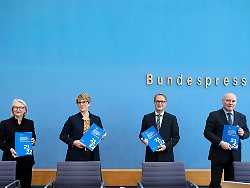One economist less
Economist Wieland leaves the Council of Experts
4/9/2022, 3:18 p.m
Instead of five economic methods, there are initially only three. Surprisingly, Volker Wieland is resigning from his post. This puts the federal government under pressure to act.
At the end of April, the Frankfurt economist Volker Wieland is leaving the German Council of Economic Experts early. This was announced by the office of the Advisory Council in Wiesbaden. According to schedule, the second term of the 56-year-old would have ended in February next year.
“After more than nine years with nine annual reports, three special reports, three productivity reports and 20 economic forecasts, I have decided to end my membership in the Advisory Council so that I can devote myself more intensively to my main activities in research and teaching and as the head of a university center ” Wieland is quoted in the message.
In the “Frankfurter Allgemeine Zeitung” he added: “And personally, the last two years during the Corona period with children of kindergarten and primary school age and relatives in need of care were a particular burden, also for the family.” He believes he has done his part. You should go “when it’s most beautiful”.
Shorter report suggested
At the same time, Wieland made it clear that for more than a year there had been “no optimal conditions for further work” in the council because the position of the Freiburg researcher Lars Feld, who had left at the time, had not yet been filled by the federal government. In the body, which then consisted of four members, “several clear majorities for substantive positions” were missing. In the area of fiscal policy and debt rules, for example, only two different positions towards politics could be shown due to the lack of a majority. “That weakens the council’s influence,” said Wieland.
The expert council of the so-called economic experts presents an annual report on economic development by mid-November. This is supplemented by an economic forecast in mid-March and by special reports on selected topics. According to the “FAZ”, Wieland had campaigned in vain for the comprehensive annual report to be replaced by several, leaner and shorter reports.
